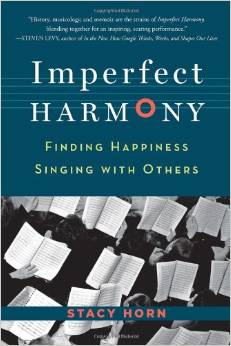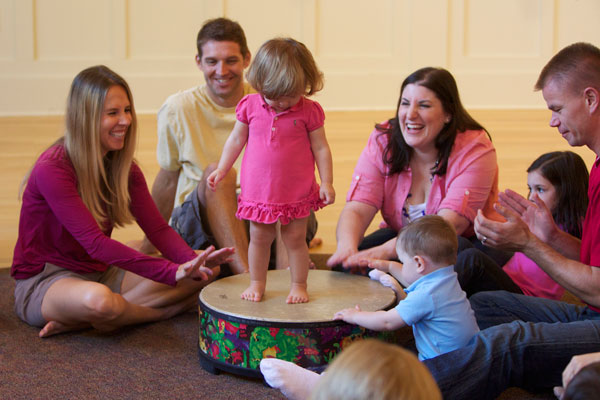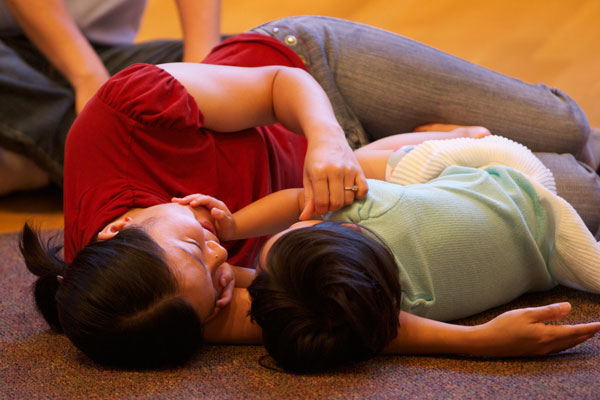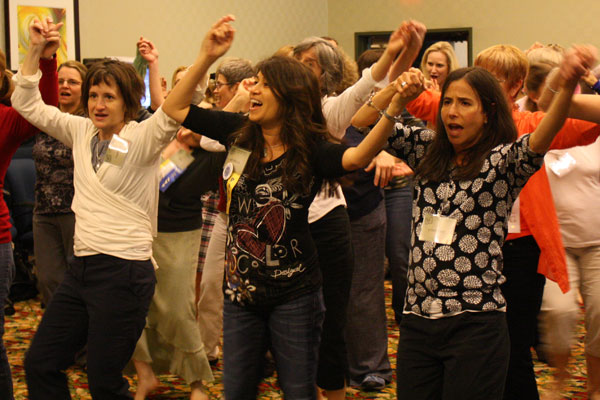 Imperfect Harmony: Finding Happiness Singing With Others
Imperfect Harmony: Finding Happiness Singing With Others
by Stacy Horn
ISBN: 978-1616200411
I just finished reading a witty and engaging book about the power of music in one’s life. It’s called Imperfect Harmony: Finding Happiness Singing with Others, by Stacy Horn. I thought it would be a poignant book for adults participating in Music Together, because it has a connection—with a twist!—to the third and fourth points of the Music Together philosophy:
- The participation and modeling of parents and other primary caregivers is essential to a child’s musical growth.
- This growth is best achieved in a playful, musically rich, and non-performance-oriented learning environment [i.e., developmentally appropriate practice].
What’s the twist? The book isn’t about children at all! It’s the story of how returning to singing in a group allowed the author to feel deeply connected to others and get back in touch with something deep within herself. In recounting her experiences, she draws the reader into an understanding of the effects singing can have on soul and body, and she shows us how a developmental approach to learning is just as valuable for adults as it is for children. In reading this review, I’m hoping that you’ll find a new way to reflect on your Music Together experience—and be inspired to make more music!

Ms. Horn’s story begins when, in her mid-twenties, “disappointing life events” motivated her to seek out activities where she could both heal and meet new people. She chose to join a choir, as she had sung in one when she was a teenager and remembered the feeling of community she’d experienced then. Ms. Horn notes that, even though she was not a particularly great singer, singing alongside the other members of the choir improved her life in ways that no other activity she had tried ever did. Singing with other adults helped Ms. Horn to grow, both into a whole person again and into a better singer.
If you reflect on your decision to enroll in Music Together, you may discover that you were naturally drawn to music activities, just like Ms. Horn. You knew intuitively that music would provide a meaningful, bonding experience for you and your child. And you may have been surprised to find that Music Together—in addition to helping your child grow towards basic music competence—also inspired you to rediscover or expand the musical parts of yourself. You might find it rewarding to write or draw about these moments in the “Musical Memory” pages in the back of your songbook.

The story continues as Ms. Horn takes the reader on a journey through some of the repertoire she sang over her three decades of participating in the choir. She recalls some of the tactics the conductor used to make the experience fun and informative for her and the other singers. She weaves in the music history of each song and writes about how the music was “brought to life” by the conductor’s historical facts and explanations.
In many ways, the conductor’s practices are similar to the parent education moments your Music Together teacher presents during each class. By relating musical milestones to what you yourself are experiencing in class, you are more likely to understand their relevance to your child’s music development. Now think about other types of developmentally appropriate practices for the adult that are part of the Music Together class structure, such as singing in harmony, singing songs in unusual tonalities and meters, and the importance of silence. These practices ensure that the class is interesting and educational for adults just as well as children!
Along the way, Ms. Horn illuminates certain points by delving into some of the science of singing. Did you know that singing relieves tension headaches and helps people with asthma and bronchitis to breathe? Did you know that making music together actually reduces stress more than relaxing with a magazine or newspaper? Perhaps this science will give you even more encouragement to make music with your family and friends outside of class. Read a little more about this in our Research Corner article.

If you’ve ever participated in a choir, you’ll probably find this book of particular interest. It will affirm you! But, whether you are already making music in a group or are just beginning to rediscover the joy that music offers, group music-making is something worth checking out! Enjoy.

Director of Research and coauthor of Music Together. A Professor of Music Education at Rowan University, Lili is a national authority on early childhood music and is actively involved in teaching very young children as well as graduate students. Her articles appear frequently in both professional journals and popular magazines. She received her Ph.D. from Temple University where she was director of the Children's Music Development Program. Through Music Together, Lili teaches Babies, mixed-age, Big Kids, and preschool classes in Princeton, NJ.



